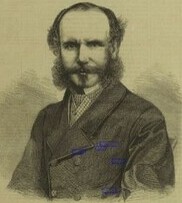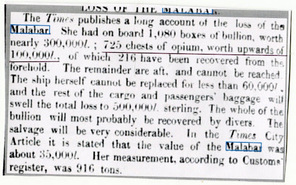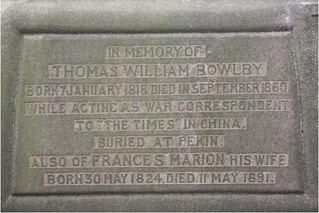
POSTS can now be found under PROJECTS.
| < PART 1 | PART 3 > |
Thomas William Bowlby (1818-1860)
Part 2 - The Times Correspondent-Insurrection, Travel, War.
Exile, Shipwreck, Incarceration, Torture, Revenge, Remembrance!
 (1)
(1)Attending the Meeting at the News Room, in the Town Hall in the Market Place South Shields on the 3rd Jan 1844 Thomas William Bowlby was perhaps looking for a partnership in a legal practise or using the resources to pursue his literary and writing interests. The firm of Russell Bowlby, Henry Snowball and John Russell Bowlby where he was indentured was declared bankrupt in January 1842 (2) and his cousin Russell Bowlby was reduced to working as a scrivener in Bishopwearmouth having sold the family home in Cleadon Meadows.
Thomas William Bowlby continued to live in Bishopwearmouth and work as a salaried clerk in firms in Sunderland and South Shields moving to London to a similar role with a large law firm in the Temple subsequently, he became a partner in a London law firm Lawrence, Crowdy and Bowlby (1846-1854) with premises at 25 Old Fish Street, Doctors' Commons, London.
Marriage
He married Frances Marion Mein (1824-1891) his stepmother's sister on the 23rd September 1848, at Canobie, Dumfries, at the same church that his father Captain Thomas Bowlby had married Margaret Matilda Mein (1804-1882). Both women were the daughters of Ann Harington Hawes. Frances, baptised at Kirk Andrews Upon Esk, Cumberland on the 19th Dec 1824 was by her second husband Dr Pulteney Mein (1769-1853), a distinguished army surgeon of the 73rd Regiment. (3)
Family Life
After his marriage in 1848, whilst still owning a property in High Street, Sunderland, he, and his wife settled in London where the first three of their seven children were born. Charles Cotsford Bowlby (1849-1921), Frances Anne Bowlby (1851-1919) and William Thomas Bowlby (1853-1922). The other children were born in Belgium: - Anthony Alfred Bowlby (1855-1929) in Namur; Wilhelmina Althea Bowlby & Thomas William Bowlby born on the 10th June 1856 in Chau Fontaine died the same day (similarly, his twin siblings Frances Martha and Eleanor had also died during their birth year of 1834 in Bishopwearmouth.) and Frederick Alexander Bowlby (1858-1911) on the 25th September 1858 in Brugge. (4)
A Change of Direction
Whilst still in his legal partnership in 1848, he was appointed Special Correspondent for 'The Times' in Berlin during the European revolutions writing especially about Hungary.
Returning to London he became interested in literary studies especially Shakespeare apparently associating with some of the literary celebrities of the day. He also promoted musical performances, in continental towns presumably during his exile ('he had a thorough knowledge of musical science') for M. Jullien, a distinguished musician.
The adverse impact of railway mania due to the complexity of contracts led to potential bankruptcy also effecting his cousin Russell Bowlby. A period of unemployment ensued; he was financially secure as his wife Frances received a substantial inheritance on the death of her father in 1853.(5)
Exile
He departed from the UK following a High Court Judgement against him in 1854. As four of his children were born in Belgium between 1855 and 1858, this suggests that this was the country which they had temporary residence (see Part 3).
Smyrna to Aidin Railway
During this period, he also worked in in an advisory capacity to a contractor in Smyrna on the construction of a section of railway line between Smyrna and Aydin which commenced on September 22, 1856, commissioned by the Ottoman Government.
 (6)
(6)This was terminated with the failure of the contractor. 'but his labours were abruptly terminated by the failure of the contractor.' (7)
1860 Special Correspondent for The Times in China Opium Wars
The opium trade perpetrated especially by the French and the British resulted by 1860 in an estimated addiction by 25% of the male population which was of increasing concern to the Chinese Qing Empire. Seeking revenge, the Chinese Qing Empire fought a war against the two countries.
With a brief to cover the Second Opium War Thomas William Bowlby was given a salary of £1,500 with expenses. The army was dispatched towards the end of the Wars to force the Chinese imperial rulers to provide access to their country to further Western trade and influence. In command on the British side was James Bruce, the 8th Earl of Elgin, his father, the 7th Earl infamous for disassembling and transferring the Greek marbles at the Parthenon to Britain.
Bowlby travelled in the same delegation which also included The Commander of the French troops Baron Jean-Baptiste-Louis Gros. During the part of the overland journey (pre -Suez Canal), he had formed a good relationship with Lord Elgin visiting the Pyramids in Egypt. Lord Elgin described him as : -
"remarkably agreeable" and saw him as good for his image back in Britain,
"the means of diffusing sound information on many points". (8)
Sinking of SS Malabar
Whilst the delegation was on board this steamship on their voyage to China, it sank during a severe storm on the 22nd May in Pont de Galle Harbour, Ceylon. All passengers were rescued and Thomas William Bowlby recorded this in a substantive article for The Times.

(9) The valuation of the opium chests provides an indication of the significance of this trade.
Peace Treaty
Reaching China, a victory for the British followed soon afterwards on August 23, 1860, at Tianjin with a peace treaty in negotiation with the Qing Empire. Seeking a report to write, he travelled with the British delegation, and their escorts to Tungchow (now Tongzhou District in Beijing) to witness the signing of the treaty which failed to materialise. (10)
Imprisonment
Thomas William Bowlby was captured by the Qing general Sengge Richen with the other 38 members of the delegation comprising of representatives not only of Britain but also from France and their Indian escorts.(11)
Torture and Death
The men were imprisoned by the Tartar general, San-kolin-sin and subjected to torture, starvation and dehydration over a period of several days; their limbs were tied with wet ligatures and as they dried, they tightened causing severe pain as well as impeding the blood circulation. Cries for water was responded to with dirt being poured into their mouths. Unfortunately, Thomas William Bowlby was not one of the nineteen survivors dying on the 22nd September 1860, due to his inhumane treatment.(12)
 (13)
(13)Revenge
Lord Elgin reportedly told a French commander "What would The Times say of me, if I did not avenge its correspondent?" (14). In consequence, approximately 3,500 British and French troops burnt down the Quig Empire's Old Summer Palace Yuanmingyuan, Beijing pillaging the priceless contents of sculptures, ceramics, art etc. which they auctioned and vandalising the magnificent gardens.
"The treasures of the Imperial Palace were irresistible and within the reach of the British and French. Officers and men seemed to have been seized with temporary insanity, said one witness; in body and soul they were absorbed in one pursuit: plunder. The British and the French helped themselves to all the porcelain, the silk and the ancient books - there were an estimated 1.5 million ancient Chinese relics taken away. The extent of this rampant abuse was highlighted even more by the burning of the Emperor's courtiers, eunuch servants and maids - many estimates place the death toll in the hundreds. This atrocious indifference towards human life inflamed international opposition," (14)

(15) Looting of the Old Summer Palace by Anglo-French forces
Burial and Commemoration
1 His wrecked body (illustrations were made) was afterwards surrendered by the Chinese and buried in the Russian Mission Cemetery developed in the 17th century outside the Anting Gate, Bejing, on the 17th Oct 1866. The burial site lies underneath a golf course. (16)
2 In Bishopwearmouth Church, a school friend, Thomas Taylor of Thomas William Bowlby paid for a commemorative plaque in the church written by Mr Thomas Burn, a Sunderland solicitor (see part 3), 'Mr. Bowlby wrote with free and dashing descriptive composition...he was man of most amiable disposition and of good conversational powers'.(17)
3 The gravestone erected in Paddington Old Cemetery following the death of his wife Frances Marion in 1891, bears a commemorative tombstone dedicated to her husband who predeceased her by over thirty years.
 (18)
(18)Reparations
His widow and orphans (5 children) were amply provided for by the indemnity 'wrung from the treasury of responsible murderers.' The Times has settled a handsome pension on the widow of Mr Bowlby. She will also be the recipient of a portion-probably £10,000 of £100,000, procured by Lord Elgin from the Chinese specially for division among the unfortunate prisoners'. (19)
Comments
I recall teaching about the Opium wars as part of a history syllabus fifty years or so ago and in debating with pupils the trade of opium, the consensus was that it was not justifiable because caused addiction.
It is debatable whether Thomas William Bowlby would have found gratification for the destruction of the Old Summer Palace, Yuanmingyuan to avenge his death. His interest in architecture and gardens is evident in his writings. 'Once they had arrived in China Bowlby wrote in his newspaper reports and private diary of his admiration for aspects of Chinese life - its fine buildings and "admirably cultivated gardens" '.
It seems incredible that Bowlby had such a fascinating life far removed from his legal profession and reminiscent of a boy's comic book adventure; ultimately ending in tragic circumstances. Because of news coverage of his barbarous murder, he achieved world-wide fame (posthumously)!
Part 3: Enigma! presents Mr Bowlby from a different perspective.
References
1.The Illustrated London News: Saturday, 31st December 1961 (note name given incorrectly as F W Bowlby)
2. Bell's New Weekly Messenger- 9th Jan 1862 (BNA)
3. Ancestry Family Tree
4. Ancestry Family Tree
5. Obituaries in BNA &
6. Various-internet research incl. Numidia Gallery
7. Various-internet research incl. Numidia Gallery
8. 'The Palace of Shame That Makes China Angry,' by Chris Bowlby, BBC News, Beijing 2 Feb. 2015
9. Dublin Evening Mail - 27 June 1860 (BNA)
10. biographies & newspaper article (BNA)
11. biographies & newspaper article (BNA)
12. Find a Grave Memorial ID: 208793260: Linda Davis, Apr 7, 2020
13. The Illustrated London News: Saturday, 31st December 1961 (note name given incorrectly as F W Bowlby)
14. History is Now magazine (Google search)
15. L'illustration by Godefroy Durand 22nd Dec. 1860-Wikepedia
16. Find a Grave Memorial ID: 208793260: Linda Davis, Apr 7, 2020
17. Berkshire Chronicle - Sat. 3 Oct. 1863 (BNA) also Sunderland Times
18. Paddington Old Cemetery Photo by Julia and Keld (Ancestry Tree)
19. London and China Express - 10 Jan. 1861 (BNA)